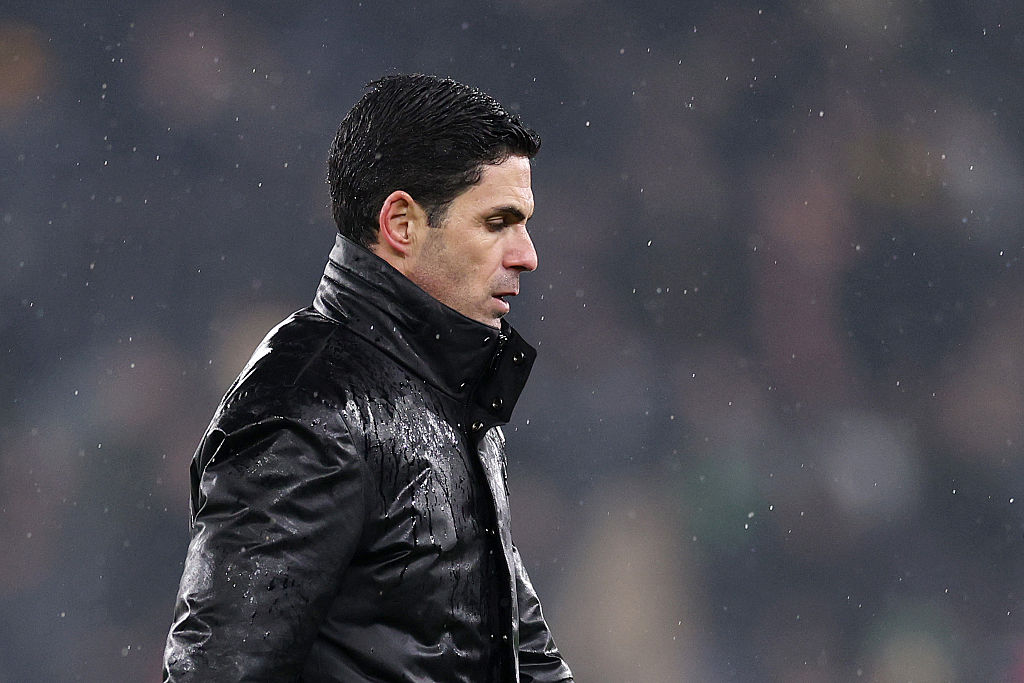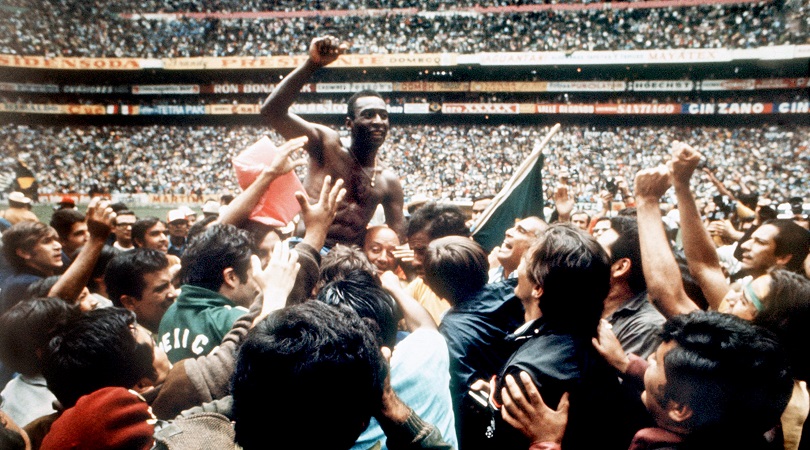
Best ever World Cup players
The finest players in the world sometimes don’t quite manage to produce their best on the biggest stage of all. Others seem fired up by the global attention, playing in ways they never could for their club. In this slideshow, we’ve ranked the 25 best World Cup players of all time…
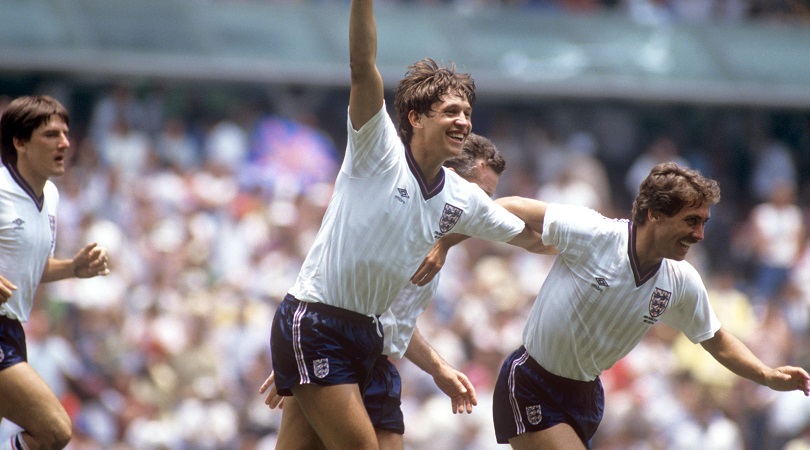
25. Gary Lineker
Lineker’s composure inside the 18-yard box is what’s earned him a place in the top 25. The England striker always seemed able to find space in the box to finish – no doubt aided by the blinding effect of that preposterous day-glo tan (making the most of his time at Barcelona).
He was the Golden Boot winner at Mexico 1986, and provided some of Italia 90’s most memorable moments – including an equaliser against West Germany in the semi-final... and that glance to the bench after Paul Gascoigne’s booking.
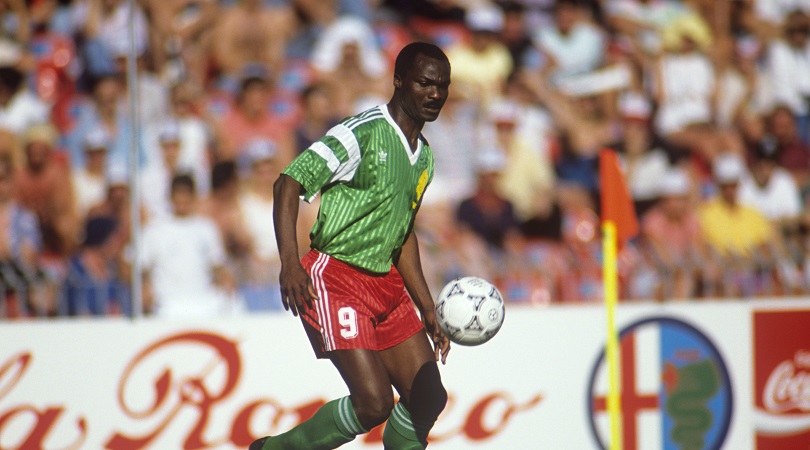
24. Roger Milla
Milla was playing on the Pacific island of Reunion when he was called up to the Cameroon squad for the 1990 World Cup. Many of his team-mates were unhappy at his recall, but the 38-year-old striker proved them wrong with four goals to help the Indomitable Lions become the first African nation to reach the last eight.
Milla returned in 1994, becoming the oldest goalscorer in World Cup history at the grand old age of 42. His corner-flag jig against at Italia 90 remains one of the most iconic celebrations ever seen at the tournament.
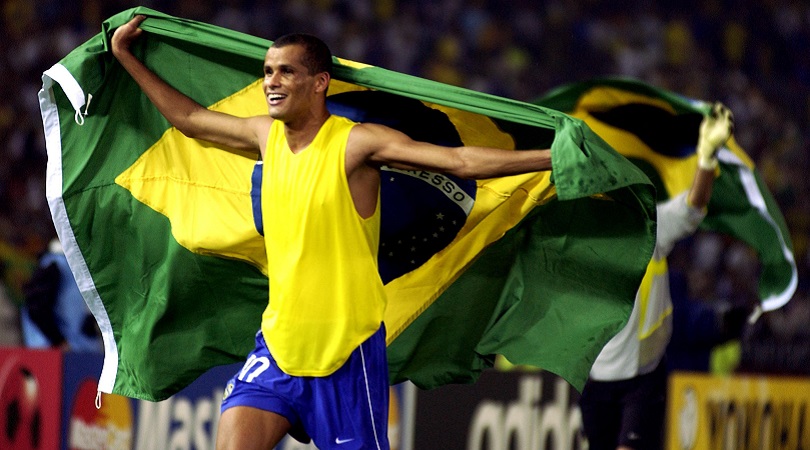
23. Rivaldo
It was hard to choose between Romario, Ronaldinho and Rivaldo. We’ve opted for the latter, because he played well in more than one tournament. Romario was the star of USA ’94 but had been hampered by injury four years earlier. Ronaldinho was brilliant in 2002, as David Seaman will remember, but failed to impress four years later.
Rivaldo played a part in Brazil’s run to the 1998 final, and then starred the show in 2002 by scoring five goals – including a memorable strike against Belgium as Brazil won their fifth World Cup.
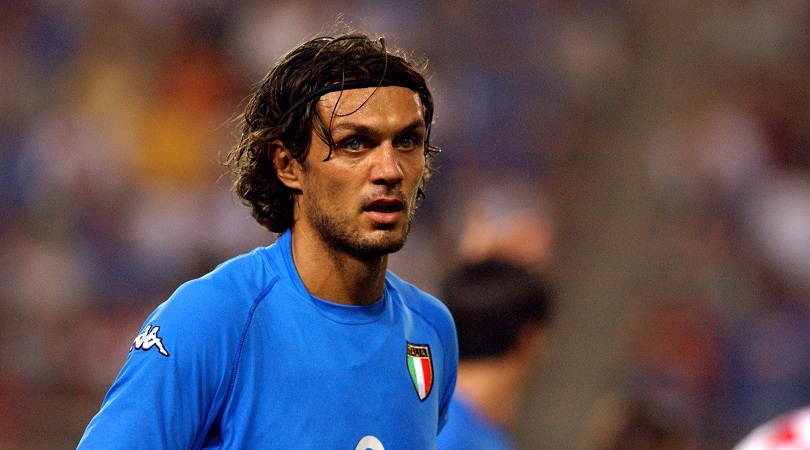
22. Paolo Maldini
The Maldini family are blessed with considerable defensive skill but not much luck when it comes to the old Jules Rimet trophy. Cesare Maldini was named in the team of the tournament at the 1962 World Cup for Italy, but his Italy team crashed out in the first round.
Son Paolo was one of the most elegant, composed defenders of his era who won five European Cups, but the World Cup eluded him too – his first three tournaments ended in losses via penalty shoot-outs, and the fourth via a golden goal.
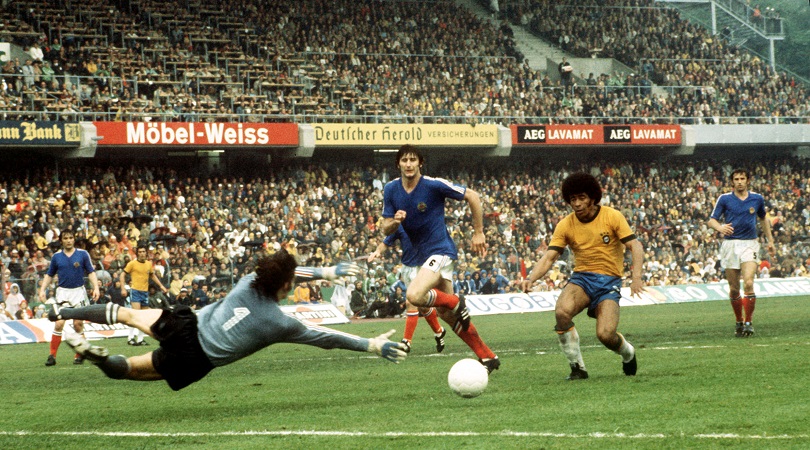
21. Jairzinho
After Garrincha retired from football following the 1966 World Cup, Jairzinho stepped into his right-wing berth for the 1970 World Cup – although positions didn’t mean much in that free-flowing side. He was a formidable part of one of the greatest teams in World Cup history, combining speed, strength and skill.
Jairzinho scored in every single game of the tournament as Brazil romped to a famous victory. He was also part of the Brazil team at West Germany 1974, with bigger hair but a smaller return of two goals.
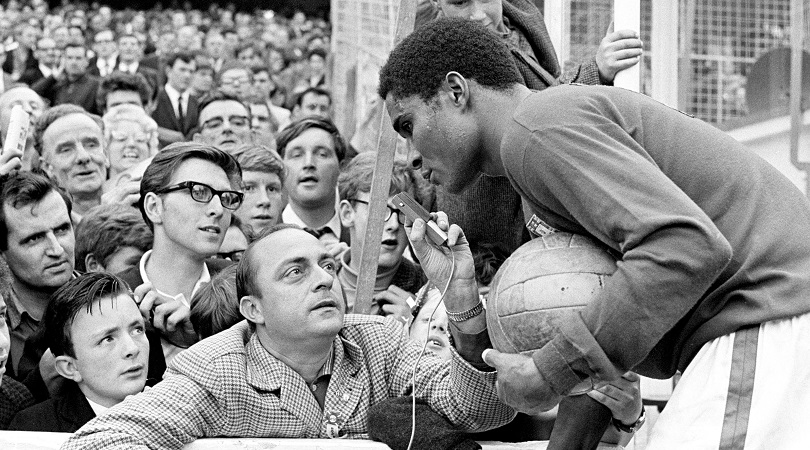
20. Eusebio
The Mozambique-born striker only played in one World Cup, but he made sure it was a good one. Eusebio scored nine times in 1966, including four against North Korea as Portugal famously came back from 3-0 down to win. That added to two goals in his first three games for the striker, whose acceleration and powerful strike made him difficult to play against.
He found the net again as Portugal lost 2-1 to England in the semi-final, ending the tournament with nine goals – enough to win him the Golden Boot, and the adoration of English locals.
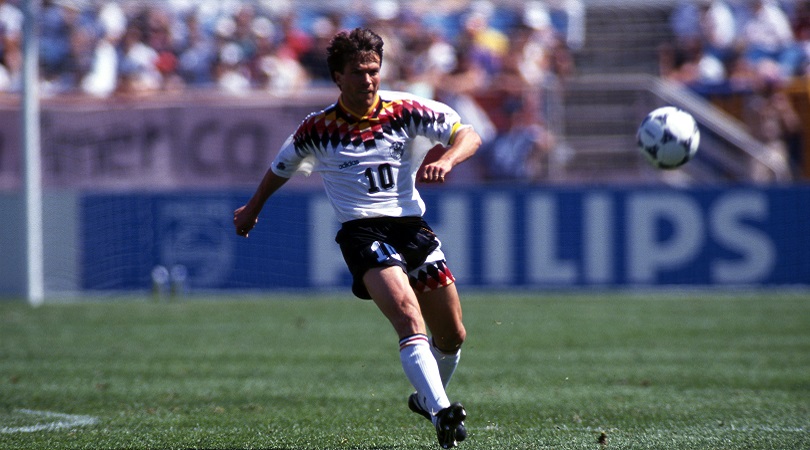
19. Lothar Matthaus
Maradona cites the German defender as the “best rival” he ever had, presumably based on their clash in the 1986 World Cup Final, when Matthaus marked the Argentine out of the game – albeit not well enough to actually win the competition.
The goalscoring midfielder played in five World Cups – a record for an outfield player, and captained his team to glory in 1990 when he was the driving force with dynamic, box-to-box runs. He was still around four years later, this time deployed as a sweeper as a re-unified Germany reached the quarter-finals.
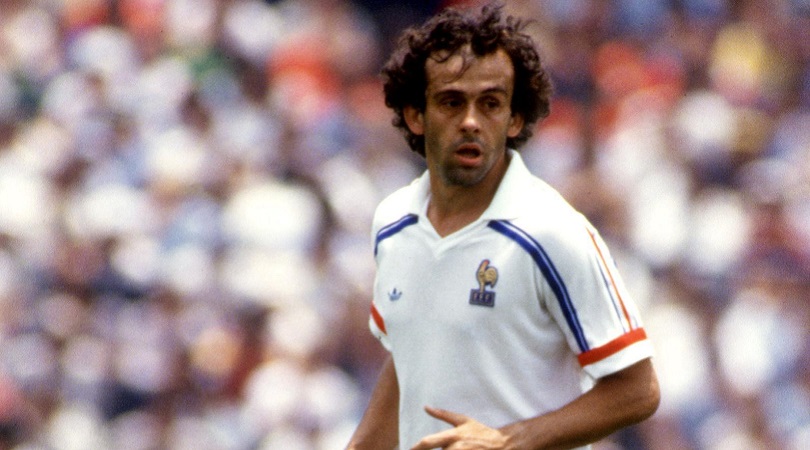
18. Michel Platini
Platini joins the likes of Cruyff, Paolo Maldini and Roberto Baggio on the list of players who have shone at World Cups but have nothing to show for it. The future UEFA president made his World cup debut in 1978 but struggled to make an impact in a vital group game against Italy.
In 1982, he was part of France’s Magic Square alongside Alain Giresse, Jean Tigana and Luis Fernandez – a quartet of talented midfielders who reached the latter stages of two World Cups and won the European Championship.
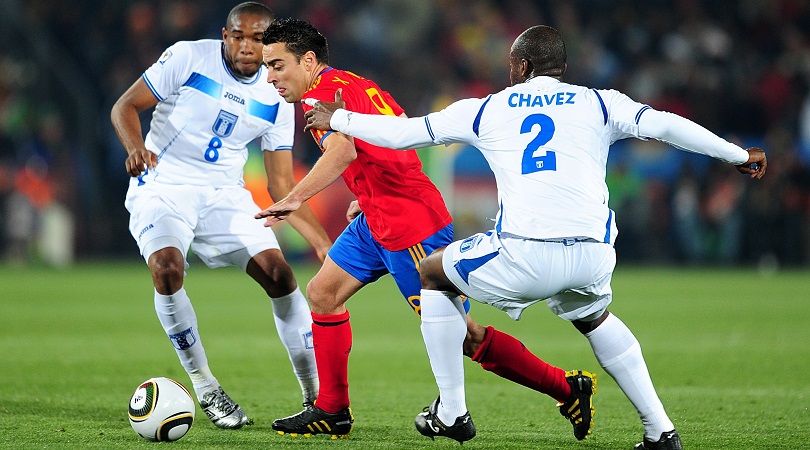
17. Xavi
The pint-sized playmaker was the metronome to Spain’s relentless tournament success, although the international brand of tiki-taka was, admittedly, a little less free-flowing than the Barcelona version. There were a lot of 1-0 wins, and long spells of possession, but Xavi was the man who helped make it all possible. He was expert at finding space in a packed midfield – setting up attacks with short, sharp passes.
In 2010, his third World Cup of four, Xavi completed more passes than any other player in the tournament and set up the winning goals in both the quarter-final and semi-final.
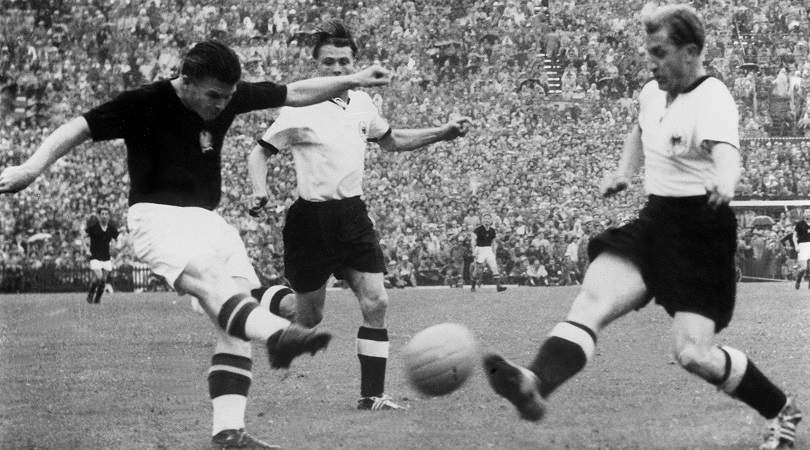
16. Ferenc Puskas
Before Wayne Rooney and David Beckham’s metatarsals, there was Ferenc Puskas’s ankle – a tabloid obsession way back in 1954, when an injury to the Galloping Major threatened the supremacy of Hungary's Magical Magyars. Puskas was their star – although short and slow, he had a ferocious shot and scored 84 goals in 85 games.
Hungary lost just one game between 1950 and 1956 – unfortunately for them, it was the World Cup final. Puskas played through the pain and looked to be on his way to a winner’s medal as Hungary went 2-0 up, only for opponents West Germany to respond with three goals to take the title.
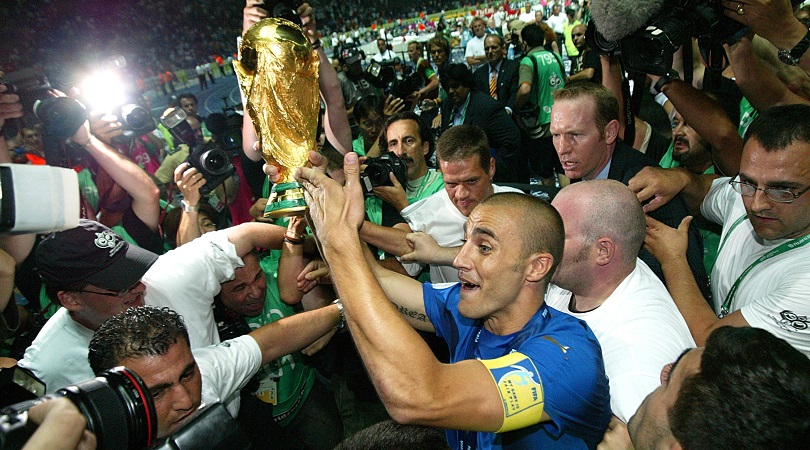
15. Fabio Cannavaro
Paolo Maldini’s shoes are some pretty big ones to fill, but Fabio Cannavaro handled the role with aplomb after taking on the Italy captaincy after the 2002 World Cup.
The 2006 World Cup showed the centre-back at his composed and committed best. Along with Gianluigi Buffon, he was one of only two players to play every minute as Italy conceded twice in the entire tournament: one an own goal, and the other a penalty. Cannavaro’s performances were rewarded with the Ballon d’Or, the Italian becoming the first defender to scoop the prize since Matthias Sammer in 1996.
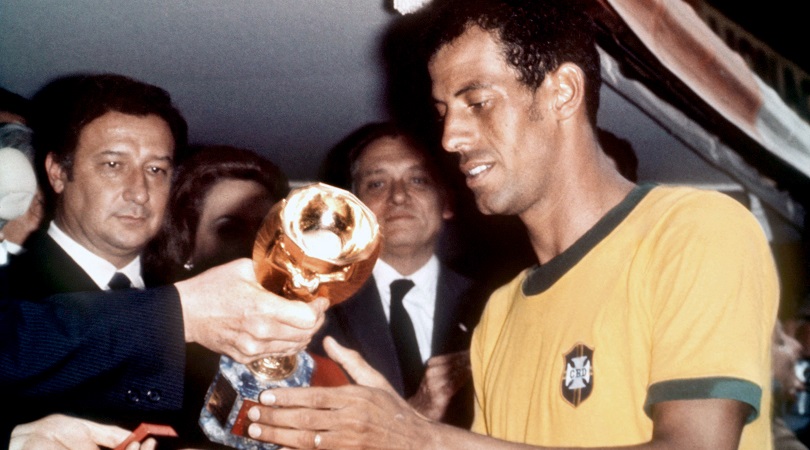
14. Carlos Alberto
He was the captain of the 1970 Brazil side often called the greatest team in history, but right-back Carlos Alberto is most fondly remembered for one thing, and one thing only: the goal. There’s a tendency to romanticise footage of that era, and in a modern game, a wider camera angle would definitely lessen the impact of the Brazilian charging onto Pele’s languid lay-off to thunder the ball home.
Yet, no matter how many modern screamers we see in glorious high-definition, Carlos Alberto will always be there – thundering down the right wing of our collective memories.
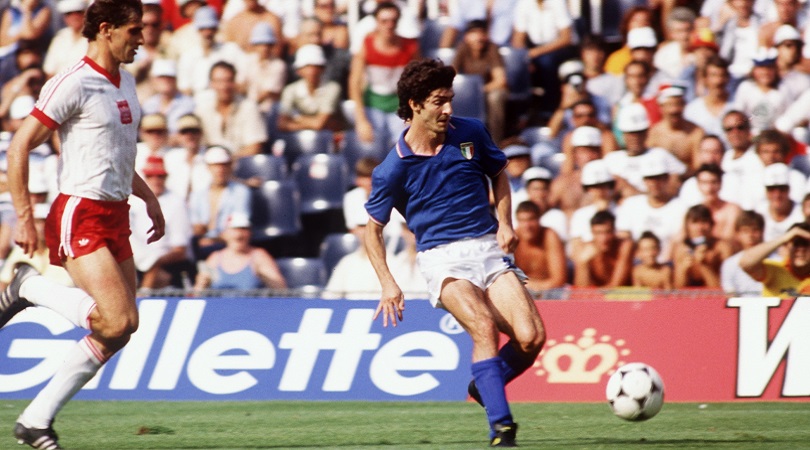
13. Paolo Rossi
There was a lot of weight on Rossi’s shoulders going into the 1982 World Cup. He’d had his three-year ban for match-fixing cut to two years, thus returning conveniently in time to make the squad, but looked out of form and off the pace in the first group stage.
Italy laboured through, and then when they faced Brazil in the second group stage, everything changed. Rossi’s hat-trick helped the Azzurri through to the semi-finals, where he netted a brace against Poland before also scoring in the victory over West Germany in the final. The striker won the Golden Ball, Golden Boot and the Ballon d’Or – not bad for someone who’d started the season on the sidelines.
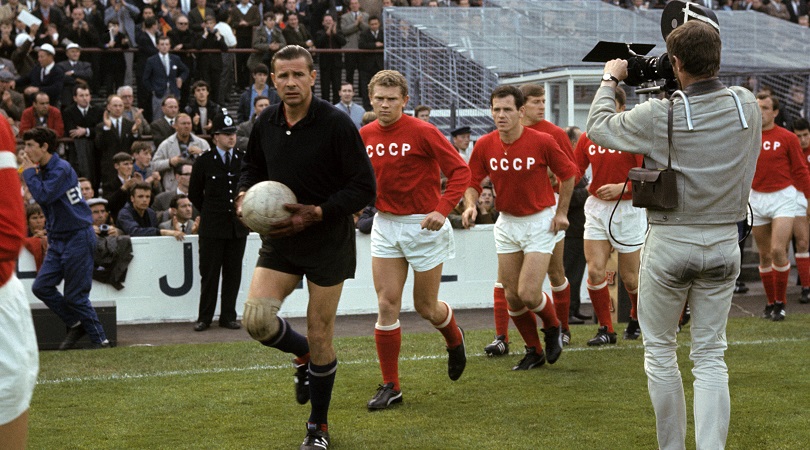
12. Lev Yashin
The Russian goalkeeper was one of the stars of the 1958 World Cup, the first to be televised globally. Yashin's habit of dressing entirely in black earned him the nickname ‘The Black Panther’, and he certainly had a knack for pulling off heroic saves. His display in a 2-0 defeat to eventual winners Brazil captured the world’s attention, and in 1966 he helped the Soviet Union finish fourth.
Yashin was ahead of his time when it came to organising a defence, often barking out orders and rushing off his line to close down attacks. He's still the only goalkeeper to win the Ballon d’Or (in 1963).
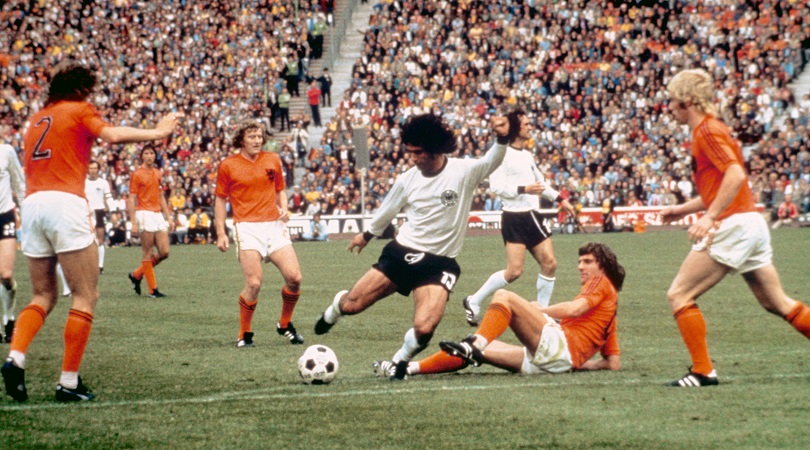
11. Gerd Muller
Germany do a good line in goal-poaching forwards who come alive during tournaments. Before Miroslav Klose there was Gerd Muller, who scored 14 goals in 13 World Cup games and sits behind only his compatriot and Ronaldo in the all-time rankings.
At the 1970 World Cup, he banged in two hat-tricks and 10 goals in total to win the Golden Boot. In 1974, he scored the winner to help an unfancied West German side overcome the Netherlands in the final.
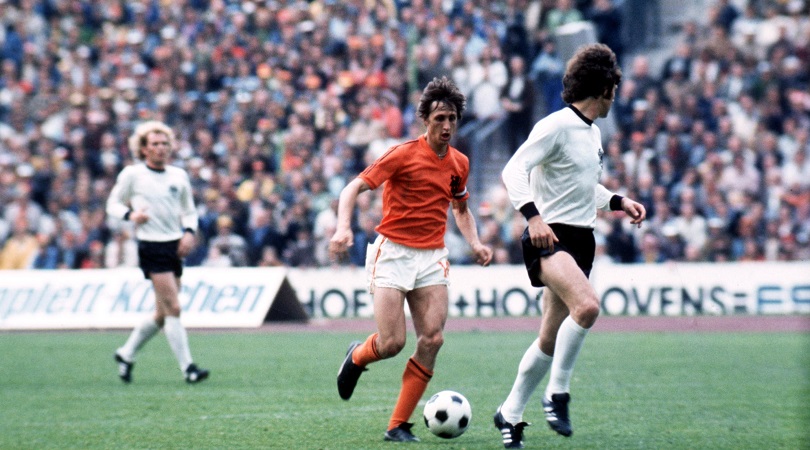
10. Johan Cruyff
Cruyff is one of the few players on this list without a World Cup winner's medal, but that hasn’t tarnished his legacy. The Netherlands had a formidable squad in the Total Football era, but it all seemed to flow through their No.14.
Cruyff was technically brilliant and full of imagination – as best evidenced by the eponymous turn with which he fooled Swedish defender Jan Olsson in the group stage. Holland romped to the final but got too cocky after going ahead in the second minute, ultimately losing 2-1 to the West Germans. Cruyff didn’t travel to Argentina four years later, but his showings in 1974 are enough for a place in the top 10.
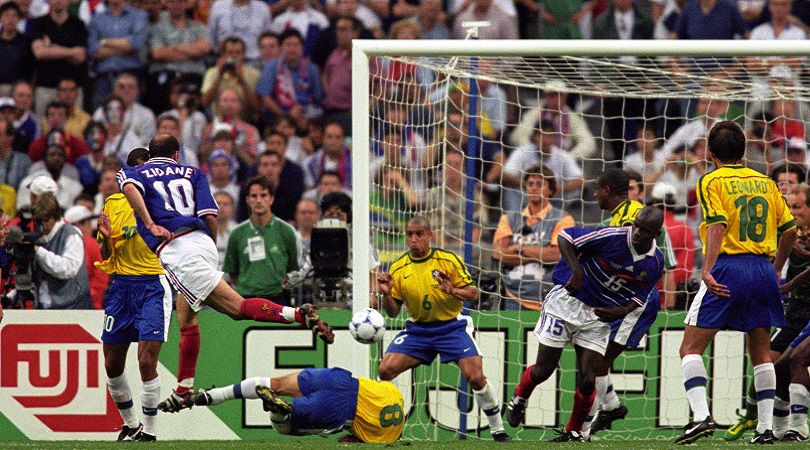
9. Zinedine Zidane
There’s a general rule of thumb with France in international tournaments: a performance in which they fulfil their exciting promise will, inevitably, be balanced out by an absolutely insane outing. Zinedine Zidane is the living embodiment of that rule.
In 1998 – after some early controversy and a red card against Saudi Arabia – he stayed cool under pressure and scored twice to help Les Bleus brush Brazil aside in the final. In 2006, he seemed set to repeat the feat: Zidane scored an ice-cold penalty to put the French 1-0 up against Italy, before planting his head on Marco Materazzi’s chest to earn an extra-time red card.
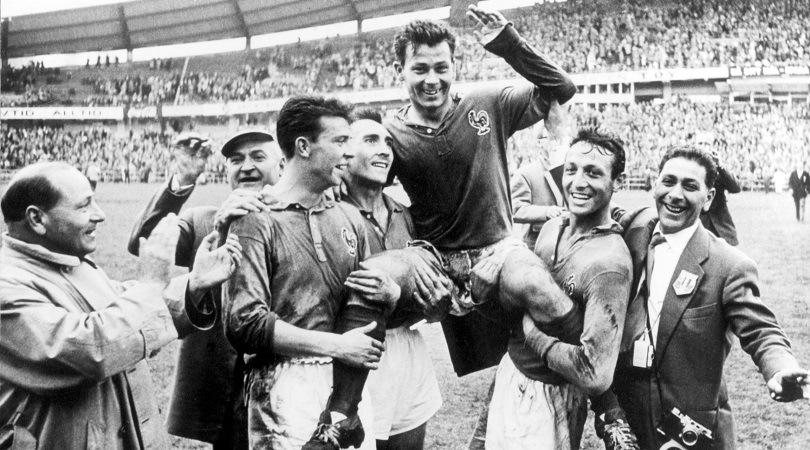
8. Just Fontaine
At the 1958 World Cup, the Morocco-born French forward scored 13 goals in six games, including four against defending champions West Germany. That single tournament – at which he formed an effective partnership with Poland-born Stade de Reims colleague Raymond Kopa – is enough to put him fourth on the all-time scorers list.
Fontaine scored in every game he played but, thanks to a strange voting system, still didn’t make it into the team of the tournament. Justice for Just.
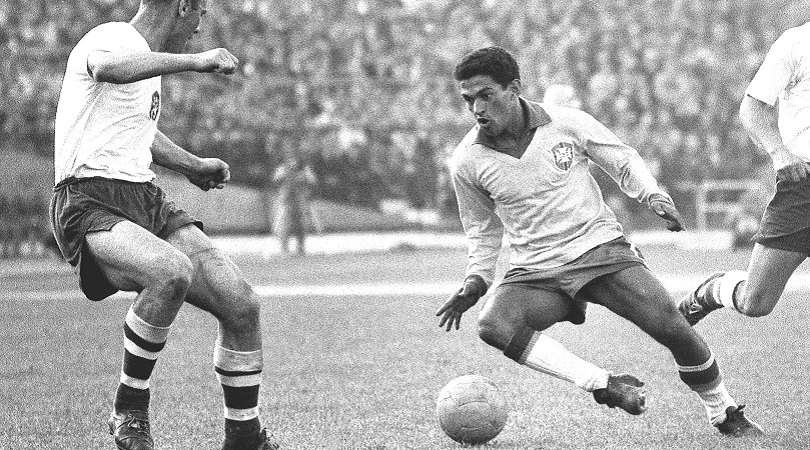
7. Garrincha
When Pele limped off in the early stages of the 1962 World Cup, the ‘Little Wren’ stepped into the fold. They were polar opposites. While fans nicknamed Pele ‘The King,’ Garrincha was ‘The Joy of the People’ for the carefree way he played, twisting and tormenting defenders with the help of a genetic trait that left him with crooked legs.
At 25, the 1962 World Cup was the peak of his playing career – he scored four to help Brazil win the tournament, but burned out soon after due to alcoholism and a life of excess.
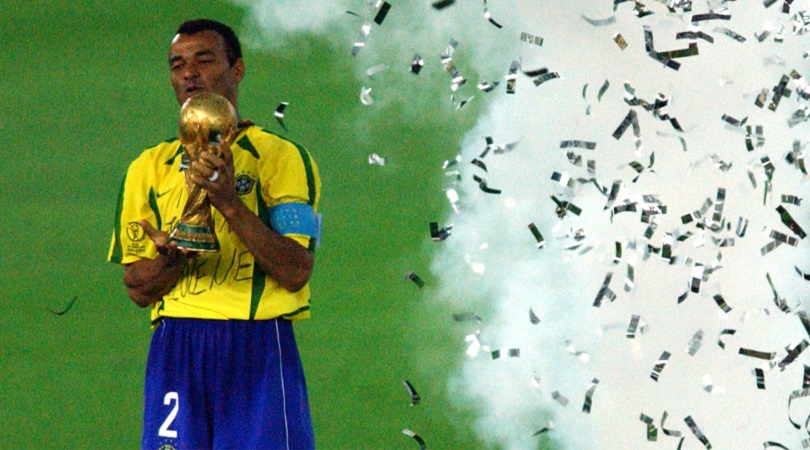
6. Cafu
With Dani Alves out for the 2018 World Cup, Brazil are facing their biggest dilemma at right-back since 1994. Back then, relatively untested right-back called Cafu came on as a substitute for the injured Jorginho early on in the World Cup final. He went on to become his country’s most-capped player, steering them to two more World Cup finals over a 16-year international career.
Regardless of what he was asked to do by various managers, Cafu was energetic and dynamic going forward, and he could actually defend a bit, too.
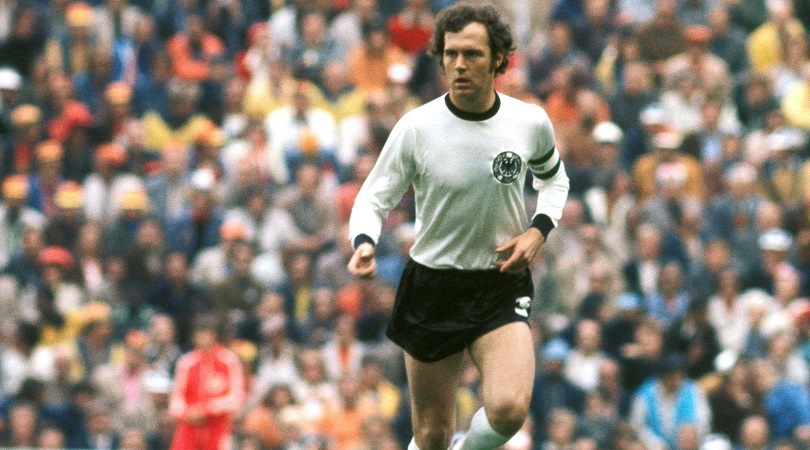
5. Franz Beckenbauer
Der Kaiser played in three World Cups, and never finished lower than third. A classy, cultured sweeper in an era when pitches and permissive refereeing made that a lot harder, Beckenbauer first came to prominence in 1966, scoring five times as West Germany reached the final.
He possessed a powerful strike from distance, which he demonstrated four years later when the Germans enacted a measure of revenge by sending England home early with a suitcase full of nicked jewellery. By 1974 he was captain, and lifted the freshly-minted, boringly-named FIFA World Cup Trophy by keeping Johan Cruyff’s Netherlands side at bay in the final.
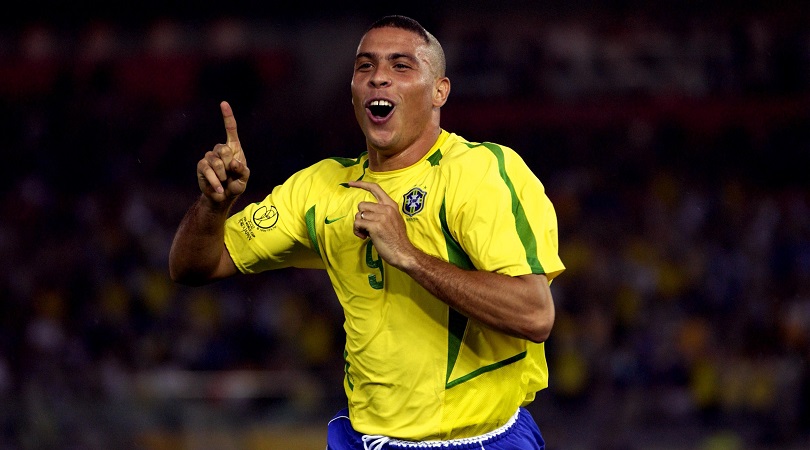
4. Ronaldo
If not for the strange happenings on the night before the final in 1998, Ronaldo could have three World Cup winner's medals. The striker went to the World Cup in 1994 without playing a single minute; four years later he was the best player in the world – pacy, powerful and frightening to play against.
He scored four and made three as Brazil zoomed to the final, but Mario Zagallo’s men lost 3-0 to hosts France with the striker a shadow of his usual self. A serious knee injury kept him out of Brazil’s entire qualification campaign for 2002, but his eight goals – including a brace in the final – fired the Selecao to glory in Japan and South Korea.
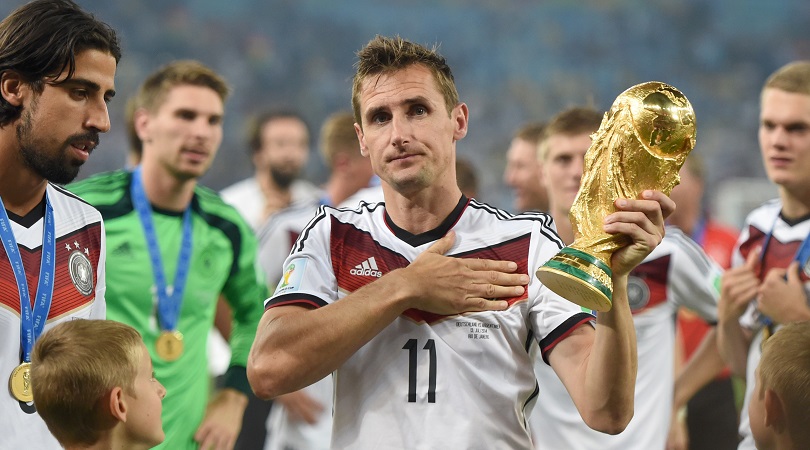
3. Miroslav Klose
FourFourTwo remains convinced that the retired Klose will find a way onto the pitch in Russia – probably when Germany are on the hunt for a late goal in the semi-final, to poke the ball home from two yards.
They might call Ronaldo O Fenomeno, but it’s Klose who is the real phenomenon – he’s the World Cup’s leading goalscorer, with 16 goals (from a combined distance of about 12 yards), and the only player in the tournament's history to appear in four consecutive semi-finals. There was nothing particularly remarkable about the former Lazio and Bayern Munich striker’s play, but the tournament stage seemed to make him come alive.
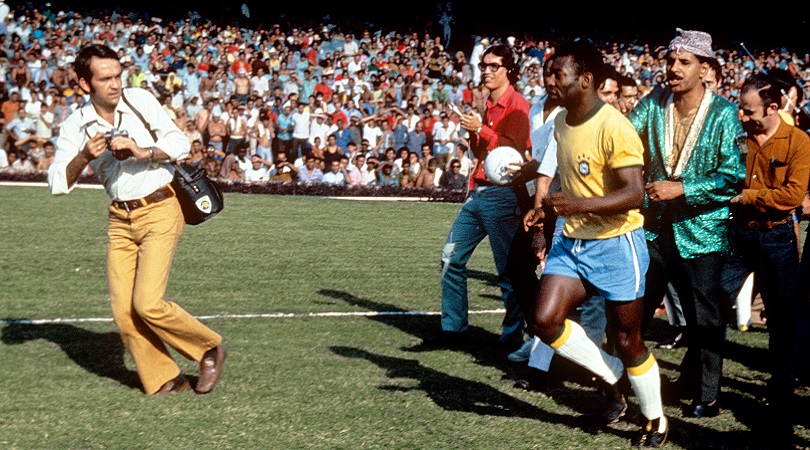
2. Pele
He scored eight million goals for Santos, but Pele’s global reputation is built on his performances in the World Cup. His first was in 1958, as a 17-year-old, when he was the youngest player in the tournament. His exploits during that showpiece included a semi-final hat-trick and two goals in a romping victory against the hosts Sweden in the final.
Injuries kept him from contributing fully to Brazil’s next two World Cup outings, so it was at his fourth World Cup, in 1970, that the Brazilian really cemented his status as one of the greatest players ever to grace football’s premier competition.
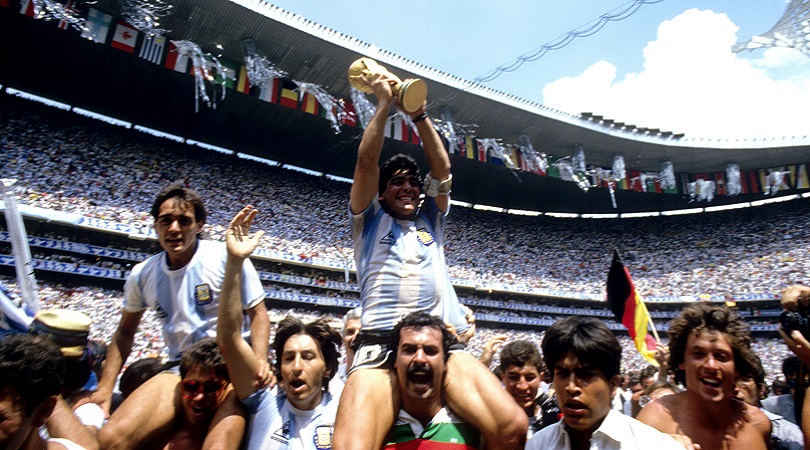
1. Diego Maradona
In 2000, FIFA conducted a poll to determine the best player of the 20th century. Diego Maradona won more than 60% of the votes, but someone in Geneva clearly thought crowning an overweight former cocaine addict with a penchant for trickery was a bit too on-brand for FIFA. So they cooked up another award – and split the prize between Maradona and Pele.
It’s an old argument, but here it is again: Pele might have won more World Cups than Maradona, but he never single-handedly dragged, dribbled and punched a team all the way to glory like the little Argentine did in 1986.
Greg Lea is a freelance football journalist who's filled in wherever FourFourTwo needs him since 2014. He became a Crystal Palace fan after watching a 1-0 loss to Port Vale in 1998, and once got on the scoresheet in a primary school game against Wilfried Zaha's Whitehorse Manor (an own goal in an 8-0 defeat).
 Join The Club
Join The Club











